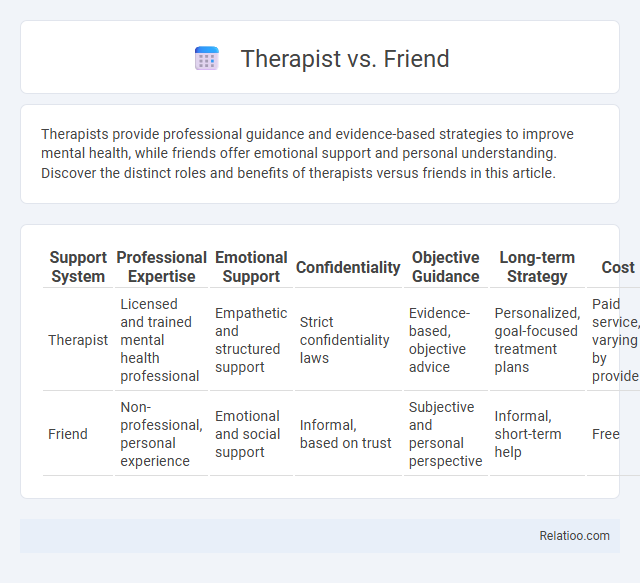Therapists provide professional guidance and evidence-based strategies to improve mental health, while friends offer emotional support and personal understanding. Discover the distinct roles and benefits of therapists versus friends in this article.
Table of Comparison
| Support System | Professional Expertise | Emotional Support | Confidentiality | Objective Guidance | Long-term Strategy | Cost |
|---|---|---|---|---|---|---|
| Therapist | Licensed and trained mental health professional | Empathetic and structured support | Strict confidentiality laws | Evidence-based, objective advice | Personalized, goal-focused treatment plans | Paid service, varying by provider |
| Friend | Non-professional, personal experience | Emotional and social support | Informal, based on trust | Subjective and personal perspective | Informal, short-term help | Free |
Understanding the Roles: Therapist vs Friend
Therapists provide professional support using evidence-based techniques to address mental health challenges, maintaining boundaries to ensure objective care. Friends offer emotional support rooted in personal connection and shared experiences but may lack the training to handle complex psychological issues effectively. Understanding these roles clarifies that therapists focus on structured intervention and confidentiality, while friends prioritize empathy and relational comfort.
Qualifications and Training
Therapists possess formal qualifications, including advanced degrees and licenses, ensuring specialized training in mental health diagnosis and treatment. Friends offer emotional support based on personal experience and empathy but lack professional credentials to address complex psychological issues. Your mental well-being benefits most from therapists' evidence-based methods, whereas friends provide relatable companionship without clinical expertise.
Boundaries and Objectivity
Therapists maintain professional boundaries and objectivity, providing structured support based on evidence and training, which differs from the emotional closeness found in friendships. Friends offer relatability and shared experiences but may lack the impartial perspective necessary for effective guidance. Your well-being benefits from the clear limits and unbiased insights only a therapist can consistently provide.
Emotional Support: Differences in Approach
Therapists provide structured emotional support based on clinical training, using evidence-based techniques to address mental health issues and promote coping strategies. Friends offer informal emotional support rooted in personal experience and shared history, which fosters relatability but may lack professional insight. The key difference lies in therapists' objective, goal-oriented guidance versus friends' empathetic listening and emotional presence driven by relational closeness.
Confidentiality and Trust
Therapists provide a confidential space rooted in professional ethics, ensuring your conversations remain private, which is often not guaranteed with friends. Trust in therapy is built on structured boundaries and expertise, fostering deeper emotional safety than casual relatability with friends. Your mental well-being benefits when confidentiality and trust establish a secure environment that goes beyond the informal support friends offer.
Communication Styles
Therapists employ active listening and reflective questioning to foster self-awareness and emotional growth, contrasting with friends who typically engage in empathetic, casual exchanges based on shared experiences and emotional support. Communication styles in therapy prioritize structured, goal-oriented dialogues that encourage insight, while friends use informal, reciprocal interactions that emphasize relatability and mutual understanding. Relatability enhances connection by allowing individuals to feel seen and heard, but therapists maintain professional boundaries to ensure effective, unbiased guidance.
Problem-Solving Techniques
Therapists employ evidence-based problem-solving techniques such as cognitive-behavioral therapy and structured interventions to address psychological issues effectively. Friends typically offer emotional support and relatable experiences but may lack the professional tools necessary for deep problem resolution. Relatability fosters trust and openness, enhancing communication but does not replace the specialized strategies that therapists use to facilitate lasting behavioral change.
Long-Term Impact on Mental Health
Therapists offer structured support using evidence-based techniques that foster long-term mental health improvements, unlike friends who provide emotional comfort without professional guidance. Your relationship with a therapist builds resilience and coping skills through personalized strategies that address underlying issues, while friends primarily offer empathy and shared experiences. This professional intervention ensures sustained mental well-being beyond the immediate relief typically found in relatable friendships.
When to Seek Professional Help
Recognizing when to seek professional help is crucial because a therapist offers trained expertise to navigate complex emotional or psychological issues that friends may not be equipped to handle. While friends provide valuable empathy and shared experiences, therapists deliver evidence-based strategies and confidentiality aimed at long-term healing. Your mental health deserves specialized support when feelings become overwhelming or persistent beyond the scope of casual advice.
Integrating Support: Balancing Both Relationships
Balancing the support from a therapist and a friend enhances your emotional wellbeing by combining professional guidance with genuine empathy. Therapists provide structured strategies and unbiased perspectives, while friends offer relatable experiences and personal connection. Integrating both relationships ensures you receive comprehensive care that addresses both technical solutions and heartfelt understanding.

Infographic: Therapist vs Friend
 relatioo.com
relatioo.com